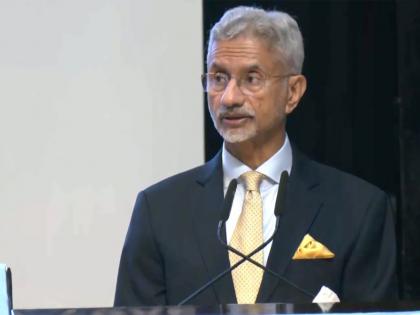At UNTCC conclave, Jaishankar emphasises India's commitment to women in peacekeeping
By ANI | Updated: October 16, 2025 14:50 IST2025-10-16T14:47:54+5:302025-10-16T14:50:18+5:30
New Delhi [India], October 16 : External Affairs Minister Jaishankar has emphasised India's commitment to the United Nations' Women, ...

At UNTCC conclave, Jaishankar emphasises India's commitment to women in peacekeeping
New Delhi [India], October 16 : External Affairs Minister Jaishankar has emphasised India's commitment to the United Nations' Women, Peace, and Security agenda, recalling that the country hosted the first International Conference on Women Peacekeepers from the Global South.
"It is no longer a question of whether women can do peacekeeping. Rather, it is whether peacekeeping can succeed without women," he said addressing the United Nations Troop Contributing Countries Chiefs' Conclave, UNTCC in New Delhi on Thursday.
"We also take great pride that we have walked the talk in our commitment towards Women, Peace and Security. Our women peacekeepers have demonstrated the unique impact that they have. They build trust in communities and give hope to vulnerable populations, especially women and children," Jaishankar said.
The Union Minister recalled that in February 2025, India had hosted the first-ever International Conference on Women Peacekeepers from the Global South, bringing together women peacekeepers from 35 nations. Also, in August this year, India hosted the UN Women Military Officers Course, which saw participation from 15 countries.
India was the first country to deploy an all-female Formed Police Unit to a UN peacekeeping mission. Deployed to Liberia in 2007 under the United Nations Mission in Liberia (UNMIL), the Indian women officers performed crowd control, guard duties, community outreach and anti-riot operations.
Indian women peacekeepers serve in various capacities across multiple missions, including South Sudan (UNMISS), Democratic Republic of Congo (MONUSCO), Lebanon (UNIFIL) and Syria (UNDOF).
Their roles include military observers, staff officers, contingent troops, medical officers and Police personnel.
The Women, Peace and Security (WPS) agenda is a global framework, launched by the UN Security Council in 2000, which aims to ensure women's participation in preventing and resolving conflict and to protect them from violence. It is built on the foundation that women's leadership is essential for lasting peace and has four main pillars: participation, protection, prevention, and relief and recovery. The agenda is further defined by ten UN Security Council resolutions that promote gender equality and women's rights across the entire conflict cycle.
In his address to the UNTCCC conclave, Jaishankar said that the idea of 'Vasudhaiva Kutumbakam' (The world is one family) of India is reflected in India's participation in UN peacekeeping. India approaches peacekeeping as a civilizational ethos and sees the world as one family, Jaishankar said
The Union Minister stressed enhanced cooperation among nations to deal with the challenges posed by terrorism, economic instability and climate change, which he said are interconnected and transcend national borders.
"The global challenges we face - from pandemics to terrorism, and economic instability to climate change - these challenges are interconnected and they transcend national borders. Our responses, therefore, must be more cooperative, transcending the competitive aspects of international politics," he said.
"The natural starting point for such collaboration is the United Nations," he said.
The Union Minister also emphasised the country's commitment to multilateralism and international partnerships.
Further, in his address, the EAM shared some "key insights" from the 80th UN General Assembly that he had attended.
He said that the UN still reflects "the realities of 1945, not of 2025," despite the massive geopolitical changes and in global membership having quadrupled over the last 80 years.
"Institutions that fail to adapt risk irrelevance, not just irrelevance but eroding legitimacy, and leaving us without recourse in times of uncertainty", he said.
Further he noted that the UN to be effective, it must reform - becoming more inclusive, democratic, participative, and representative of today's world.
Jaishankar said that the UN "must amplify the voices of the developing world and reflect the aspirations of a rising Global South. The UN's legitimacy, and I would say the UN's credibility depends on it doing so."
Disclaimer: This post has been auto-published from an agency feed without any modifications to the text and has not been reviewed by an editor
Open in app